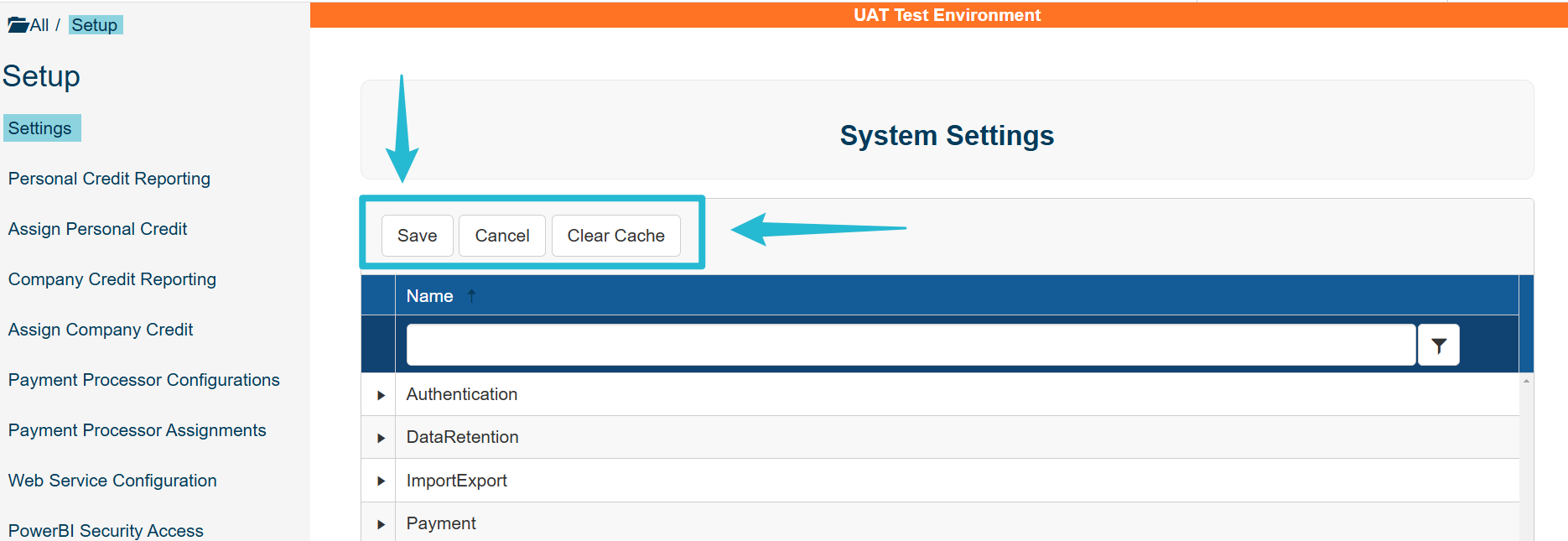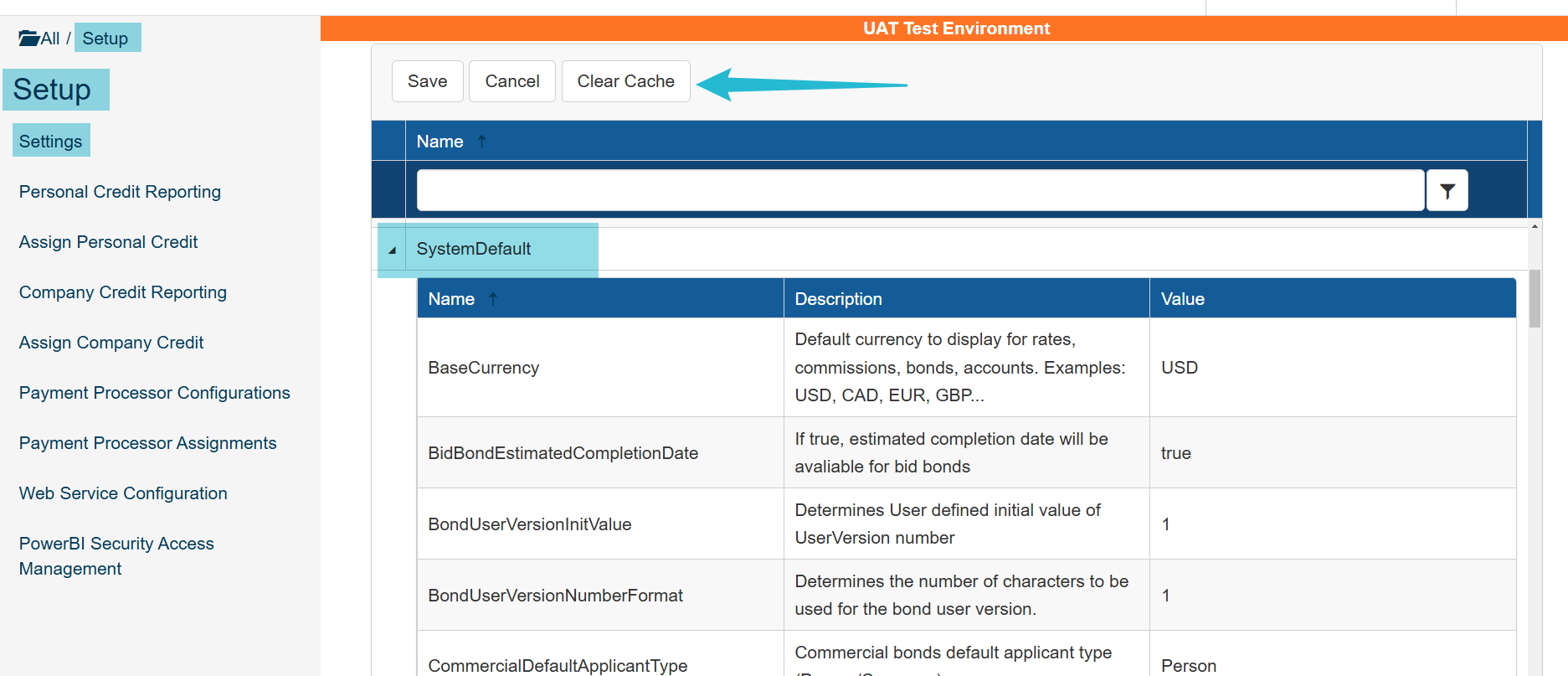System Setting Defaults
Overview of System Settings
Within Tinubu Surety Solution for Carriers (TSC), administrator users can access system settings to modify how certain functions are handled. These settings allow each client to customize certain areas of TSC to best fit their business practices.
There are many settings within TSC that are pre-configured whenever a new site is delivered. These should not be changed. This guide is to point out and explain the settings which are available for clients to modify to meet their needs.
Change Settings
If you make any changes to settings within TSC, be sure to save the changes.
Select the Save button
Clear the application cache with the Clear Cache button at the top of the Settings page for the changes to take effect.

The System Default settings are for enabling or disabling distinct system features within TSC.
Select Settings/System Default to edit the settings.
Please see below for more details on items which can be changed.

Default Setting Definitions and Parameters
BidBondEstimatedCompletionDate
The BidBondEstimatedCompletionDate setting controls the display of the estimated completion date for bid bonds only to allow or disallow the field to be shown during the bond application and subsequent actions on the bond.
CommercialDefaultApplicantType
The CommercialDefaultApplicantType setting sets which type of applicant will be automatically selected for Commercial bonds. Enter Person or Company in the Value column for the setting.
This setting establishes the default value, but this can be altered manually on the Initial Bond Information Page when purchasing a bond.
If the default applicant type has no questions asked on a particular bond configuration, the system will not list that type in the options in the applicant type dropdown.
CompanyTileDisplay
The CompanyTileDisplay setting adjusts the fields to be shown on company tiles without them being expanded. The company fields available are:
CompanyName|CompanyPhone|CompanyEmail|CompanyFEIN|
CompanyCustomerNumber|CompanyWebAddress|CompanyConcatAddressLine1|
CompanyConcatAddressLine2|CompanyConcatFullAddress|CompanyStreet|
CompanyZipCode
Each one can be entered and separated the next by a pipe character (|).
ContractDefaultApplicantType
The ContractDefaultApplicantType setting sets which type of applicant will be automatically selected for Contract bonds. Enter Person or Company in the Value column for the setting.
This setting establishes the default value, but this can be altered manually on the Initial Bond Information Page when purchasing a bond.
If the default applicant type has no questions asked on a particular bond configuration, the system will not list that type in the options in the applicant type dropdown.
ContractBondBehavior
The ContractBondBehavior setting determines New Bonds being automatically added to WIP
The new ContractBondBehavior system setting can be located at Setup/Settings/SystemDefault. This new setting will control if a newly purchased contract bond will be automatically updated to the WIP attached to the bond's account.
DefaultAccountRateModifierCode
The DefaultAccountRateModifierCode setting designates the type of Account Rate Modifier to be used with newly created Account Applications Refer to https://tinubu.atlassian.net/wiki/pages/resumedraft.action?draftId=4847665153&draftShareId=e47c6955-f336-4354-9ccf-72a09e78d4a5 for more detils.
This setting establishes the default value, but this can be altered manually on the Account Application.
DefaultAttorneyInFactEmail
The DefaultAttorneyInFactEmail setting sets the e-mail address for any e-mail templates that are designated to go to an Attorney-In-Fact when the Attorney-In-Fact does not have an e-mail address in TSC. This can go to either the Agency through which the bond is being purchased, or to the carrier for the bond configuration which is being purchased.
Enter Agency or Carrier in the Value column for the setting.
DefaultCommercialAcctLOCType - DefaultContractUserAuthType
The authority levels for carrier users and accounts have been expanded to allow limits to be applied by bond class. To control the default settings for the application, use the following settings located at Setup/Settings/System Defaults:
DefaultCommercialAcctLocType
DefaultCommercialUserAuthType
DefaultContractAcctLocType
DefaultContractUserAuthType
§ For each of these settings enter 1 for Global or 2 for By Class
Global
will continue the existing functionality previously used. This will keep the single and aggregate limits grouped, not dependent on the type of bond class.
Class
will apply single and aggregate limits to approvals based on the bond class limit and does not aggregate across the bond classes.
These same definitions will be used when overriding these default values on accounts or users.
When using bond class limits, the default limits are determined on the bond class at Reference Tables/Bond Classes/Edit.
These default limits will take effect only if the application settings are configured for By Class or if the account or user is configured to use By Class.
Users can be configured with the ‘Commercial Authorization Type’ and ‘Contract Authorization Type’ fields to use the system settings defaults (see point 1 of these notes) or override those settings for a particular user. Each field has 3 options:
Use Default – will use the system setting
Global – will override the setting to use global limits
By Class – will override the setting to use the bond class limits
Each user, when using Bond Class limits, can have the default bond class authority limit overridden for any bond class. The overrides are configured at System Tables/Users. These overrides are divided into commercial and contract limits.
When editing the class limits, the default values from the bond classes will auto-fill. To override this, the overridden field should be checked to true and then the single and aggregate limits are editable.
Account can be configured with the Commercial LOC Type and Contract LOC Type fields to use the system settings defaults (see point 1 of these notes) or override those settings for a particular account. Each field has 3 options:
Use Default – will use the system setting
Global – will override the setting to use global limits
By Class – will override the setting to use the bond class limits
Each account, when using Bond Class limits, can have the default bond class authority limit overridden for any bond class. The overrides are configured with the Update Commercial Bond Class Limits and Update Contract Bond Class Limits account actions.
When editing the class limits, the default values from the bond classes will auto-fill. To override this, the overridden field should be checked to ‘true’ and then the single and aggregate limits are editable.
DisallowLeapYear
The DisallowLeapYear setting will have the system return a warning message that it will not accept the date of February 29th as a valid date for an Estimated Completion Date, Effective Date, or Expiration Date.
EnableRiderDocumentGenerationOptions
The EnableRiderDocumentGenerationOption setting sets the configures any rider bond actions to offer the following options concerning the documents to be printed:
Print Rider Documents - generates documents assigned to this rider lifecycle.
Reprint Renewal Documents - regenerates documents assigned to the renewal lifecycle.
Reprint Original Bond Documents - regenerates documents assigned to the new bond lifecycle.
Do Not Print Documents - will not generate any documents, except if an optional document is selected.
If the setting is false, the bond action will only produce the rider documents assigned and any applicable document sets.
ExcludeBidFromLoc
The ExcludeBidFromLoc setting removes the total penalty from an account’s bid bonds from the contract LOC used limit.
GlobalBondNumberEmail
The GlobalBondNumberEmail setting sets which email receives global bond number block notifications. See the Carrier Global Bond Numbers guide for more details.
PersonTileDisplay
The PersonTileDisplay setting adjusts the fields to be show on people tiles without them being expanded. The people fields available are:
PersonName|PersonEmail|PersonPhone|PersonConcatAddressLine1|
PersonConcatAddressLine2|PersonConcatFullAddress|PersonStreet|
PersonZipCode|PersonFirstName|PersonMiddleName|PersonLastName|
PersonFullSSN|PersonHomePhone|PersonWorkPhone|PersonCustomerNumber|
PersonTitle|PersonDateOfBirth
Each one can be entered and separated the next by a pipe character (|).
QuoteExpireDays
The QuoteExpireDays setting sets how many days a quote will be available for purchase from the date the quote was created. Once this time period has passed, the quote will be automatically declined.
This setting establishes the default value, used if no value is present at the bond configuration level. However, this value can be overridden from any bond configuration. See the https://tinubu.atlassian.net/wiki/pages/createpage.action?spaceKey=TDD&title=Bond%20Configuration%20Settings guide for more details.
ReferralExpireDays
The ReferralExpireDays setting sets how many days a referral will remain until automatically rejected. Once this time period has passed, the referral will be automatically rejected.
This setting is used in conjunction with the RejectReferrals background job. See the https://tinubu.atlassian.net/wiki/pages/resumedraft.action?draftId=4847665165&draftShareId=f421fc9d-bc9c-451b-b6bb-5e5258992f0b guide for more details.
UseGlobalBondNumbers
The UseGlobalBondNumbers setting configures TSC to use the global bond numbers, rather than the specific carrier bond numbers. See the Carrier Global Bond Numbers guide for more details.
Test Mode Bond Numbers will override both carrier and global bond numbers if a bond configuration is in Test Mode. See the Assigning an Agency to a Bond - Test Mode guide for more details.
